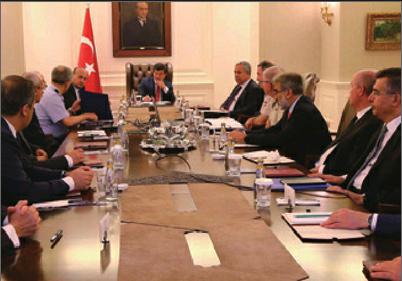Are the Enemies of Turkey’s Enemy Its Friends?
2015-09-06ByLiWei
By+Li+Wei

Turkey launched air strikes against targets of the Islamic State (ISIS) in Syria on July 24, marking not only retaliation for a recent spate of terror attacks within its borders but also a major shift in the countrys stance on ISIS, as it switches from the role of passive spectator to active player in terms of military involvement.
In the past, Turkey was reluctant to either tighten control on its borderline with Syria or join the U.S.-led multinational coalition against ISIS, reasoning that the jihadist group had the potential to overthrow its nemesis Bashar alAssads regime in Syria. But Turkeys wait-andsee policy has returned to haunt the country that links Europe and Asia, with ISIS now running amuk and posing an imminent threat.
Under these circumstances, joining the anti-ISIS coalition was perhaps an inevitable choice for Turkey with regard to safeguarding its homeland security. This policy shift will have far-reaching consequences for the country both on the home front and in its international efforts against terrorists in Syria and Iraq.
Why the turnaround?
Turkey has been accused of turning a blind eye to ISIS many times before, notwithstanding the fact that the latter organization did not until recently present a direct threat to the country.
For Turkey, three major strategic objectives existed in its relation to Syria and Iraq. The first one was to overthrow the Assad regime. Turkish President Recep Tayyip Erdogan was the first state leader to urge Assad to hand over power when Syria fell into civil war. The second objective was to contain the rise of Kurdish forces and undermine their sovereign claim on land lying within Turkish borders. The last was to maintain absolute Sunni dominance and to weaken the grip of Shiite forces in Syria and Iraq, thus consolidating Turkeys position in the Middle East.
The rise of ISIS, a Sunni jihadist group pieced together from the remnants of various opposition forces in the Syrian Civil War, initially appeared fortuitous for the Turks. The group took both the Shiite-dominated Assad regime and the Iraqi Government as their sworn enemies, also setting itself against Kurdish forces. From the perspective of Turkey, ISIS could be used as a tool to reach its goals and for this reason, it had no interest in joining the U.S.-led coalition against the organization. Whats more, Turkey was tolerant to the activities of ISIS on its border, allowing jihadists to smuggle personnel and arms into ISIS-controlled areas, provided the group did not threaten Turkeys national security.
The hoped-for outcomes, however, failed to materialize as ISIS expanded rampantly in east Syria and north Iraq. Now that ISIS has become a force to be reckoned with in the Middle East, Turkey faces both the security threat of jihadists and pressure from the international community.
To further complicate matters, the balance of power in Syria and Iraq is changing. As a major resistance force against ISIS, Kurdish forces now draw support from both Syria and the West.
In Syria, the Assad regime has withdrawn troops from Kurdish-populated areas and allowed Kurds to govern these areas autonomously. The Kurdish Alliance, a subsidiary group of the Kurdistan Workers Party(PKK, a separatist group in Turkeys Kurdishpopulated areas), was also permitted free rein in its activities in the country. The United States and its allies have offered arms and funds to Kurdish militias, ensuring that they are well-equipped to fight against ISIS.
In Turkeys parliamentary elections in June, the ruling AK Party lost its majority and was obliged to form a coalition government with other political parties, including the Democratic Peoples Party (DEHAP), a Kurdish nationalist political party which won 13 percent of the ballot. DEHAP was banned in March 2003 by Turkeys Constitutional Court owing to its support for the PKK. The Turkish President Erdogan and his AK Party now have to tackle the thorny issue of how to deal with the growing influence of the Kurdish party in the coalition government of which they are part. Meanwhile, Turkey has also bombed PKK camps in northern Iraq in order to suppress escalating violence carried out by Kurdish separatists.
The ISIS-linked terror attacks in Turkey have put a great deal of pressure on the Erdogan administration. On July 20, 32 people were killed and over 100 people wounded by ISIS-linked militants in the Kurdish-populated town of Suruc, located near the border with Syria. In the aftermath of the terror attacks, the Turkish Governments policy on ISIS was slammed across the country. The latest polls show that over 90 percent of Turkish respondents do not support ISIS and nearly 70 percent of respondents demand that the government take concrete military action against the group.
Turkeys NATO partners have long been no less critical of its irresolute attitude toward ISIS. The country has been charged with letting a large number of self-styled Western jihadists enter Syria and Iraq by crossing the Turkish border. It is feared that these well-trained jihadists may conduct terror attacks when they get back onto home soil, presenting a potent security threat to the West.
The changing situation in the Middle East in recent months has pressed Turkey to join in the military intervention. The Assad regime looks unlikely to collapse in the short run while Shiite forces grow ever stronger across East Asia. Yemens Shiite Houthi group took over the capital Sanaa and expelled President Abd Rabbo Mansour Hadi in February. The Saudi-led Arab coalition has been engaged in a war against the Houthis since late March aiming to restore Hadis legitimacy. But the conflict between the Shiites and the Sunnis will continue in the country for some time to come.
In mid-July, Iran reached an agreement in nuclear talks with the international community. The United States and the West agreed to lift sanctions should Iran meets the terms of the agreement. Hostility between Iran and the West is gradually subsiding, meaning Shiite forces will gain a stronger footing in the Middle East. Of great concern to Turkey must be the prospect of Iran offering more aid to Assad.
The abrupt shift in Turkeys policy is most clearly manifest in decisions made with respect to domestic and international policy.
Internally, Turkey has strengthened its security and border controls. These measures have included building a 3.5-meter high wall along the countrys borderline, setting up watchtowers and conducting 24-hour surveillance through cameras and drones.
Meanwhile, Turkish police have initiated a series of large-scale raids countrywide. On July 24, a total of 251 ISIS-related and PKKlinked suspects were arrested by local police. In an operation in Istanbul, the Turkish Government mobilized 5,000 police officers and searched 140 separate locations.
Externally, Turkey has carried out air strikes on ISIS and PKK targets. At the same time, the country has agreed to allow the United States to use its Incirlik and Diyarbakir airbases in the fight against ISIS. The two governments are also working together on building an “Islamic State-free zone” to ensure greater stability along the Syrian-Turkish border.
But it is worth noting that Turkey appears to be more interested in hitting Kurdish militias than fighting against ISIS. Evidence has come to light that the Turkish air force has conducted far more strikes on Kurdish targets than on ISIS.
A can of worms
Doubtless the strikes will draw fierce retaliation from ISIS. If Turkey tightens access into Syria, ISIS would take risky measures to secure its links with the outside world. In that case, Turkey will face the unenviable prospect of more terror attacks.
Owing to strikes on PKK targets, the Kurdish peace process, an issue which has dogged Turkey for years, is now suspended. The PKK, founded in the late 1970s, pursues an independent Kurdish state within Turkey. Since the group launched an armed struggle against the Turkish Government in 1984, over 40,000 lives have been forfeited in the conflict between the two sides. In March 2013, both sides announced a ceasefire. With Turkeys recent bombing of PKK targets, however, that agreement has been consigned to the dustbin of history.
Nevertheless, Turkeys participation in international anti-terrorism efforts will enhance the fight against ISIS. By using Turkish airbases, U.S. jet fighters will be able to strike ISIS targets with increased efficiency, especially those in Dhaka, ISISs adopted capital city.
More importantly, if Turkey implements effective controls on its borderlines with Syria and Iraq, the links ISIS possesses with the outside world will be effectively cut off, a crucial step forward in the fight against the group.
The real test of Turkeys resolve will lie in its implementation of proposed policies. As early as 2003 and 2006, the Turkish Government vowed to establish a strict borderline security system. But the measures they took proved in the final analysis ineffectual.
At present, the situation is incredibly tangled. Turkey is launching strikes against Kurdish militants while the United States is backing those same militants in their fight against ISIS. How the three might best coordinate their triangular relationship now presents a major quandary for all parties concerned.
